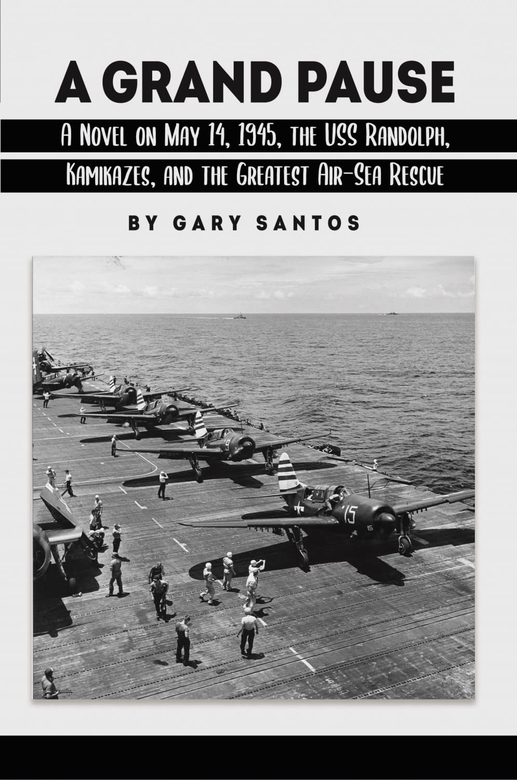
Immersing readers in the tension, terror, and unpredictability of war, A Grand Pause: A Novel on May 14, 1945, the USS Randolph, Kamikazes, and the Greatest Air-Sea Rescue by Gary Santos is a uniquely penned blend of historical fact and well-informed fiction.
In the final months of World War II, with unimaginable losses on both sides of every battlefield, the Allied fleet has closed in on Japan, slowly choking the Empire as it island-hops toward a full-scale ground invasion. On May 14, 1945, yet another day that lives in infamy, flight squadrons are finally tasked to attack mainland Japan and interrupt the relentless waves of kamikaze fighters, but this leaves the fleet with weakened defenses.
Mike is a dedicated and overworked plane captain, Wellington is a lieutenant with wealthy roots and deep faith, and Eugene is a fresh-faced Navy recruit who has already experienced his share of horror. Onboard the Randolph – a mystery ship with more firepower than any other warship in the fleet – these three men are anonymous cogs in a massive machine of war, but the actions of even a single man can save countless lives, or avert disaster.
With visceral action sequences and life-and-death decisions that capture the chaotic and cruel fog of war, this novel details the heroic rescue of Air Group members who didn’t make the journey back, and the real-world costs of never leaving a man behind. Writing about macrocosmic events through microcosmic figures and moments, readers can feel the epic balance of responsibility and risk in every barked order and obedient salute.
There are countless characters who step into the author’s spotlight for a scene or a chapter, providing a comprehensive glimpse into the disparate mindsets of sailors, pilots, soldiers, and leaders, as well as their nuanced duties and personalities both onboard and in the heat of battle. There are also colorful cameos from Midwestern journalists, flamboyant commanders, brainwashed enemies, and cold-hearted puppet masters, allowing for a rare insight into both sides of this bloody conflict.
While there are many narrative accounts of World War II that bring critical moments of courage or valor to modern light, few so artfully blend fact and fiction into a compelling whole like this one. Military histories are often shown through a lens of sacrifice and heroism, and may not reflect the internal struggles and trauma that continue to affect soldiers for years and decades to come. Santos expounds on the psychological impact of “pointing the gun,” even if you aren’t the man pulling the trigger, and gives ample time for philosophical and delicate examinations of war, death, and national loyalty. Honing in on the final stage of the war after Germany surrendered grants readers a deeper understanding of the tragic loss of life caused by this final extension of violence.
Some of the battle sequences are hard to follow, with the prose leaping forward in pace and urgency, so the reading experience becomes more about the sensation than the details, but as a whole Santos’ writing is lyrical and thoughtful, yet also stark and gritty, capturing the emotional and physical weariness of the soldiers and sailors off the coast of Okinawa and beyond. All told, this is a remarkably researched and engaging historical novel, where the line between history and imagination is brilliantly blurred.
Book Links
STAR RATING
Design
Content
Editing
Get an Editorial Review | Get Amazon Sales & Reviews | Get Edited | Get Beta Readers | Enter the SPR Book Awards | Other Marketing Services























Leave A Comment